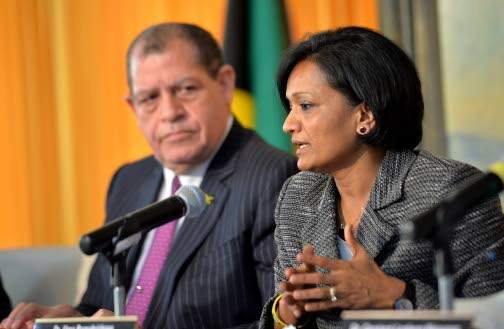Minister of Finance and the public Service Audley Shaw listens as head of the International Monetary Fund (IMF) Staff Mission Team to Jamaica Dr Uma Ramakrishnan addresses journalists earlier this year at the Office of the Prime Minister.
Yesterday the IMF released its second review of Jamaica’s current Stand-By Arrangement. The focus of the review included exchange rate and liquidity management, and ongoing wage negotiations, amongst other things.
With respect to the exchange rate, the IMF staff appraisal observed that, “Moving to inflation targeting requires making price stability the anchor for monetary policy alongside a flexible, market-determined exchange rate.”
It continued, “The accommodative monetary stance — with a loosening bias should weak growth persist and downside inflation risks materialise — is appropriate.”
Unsurprisingly, the appraisal added, “Pressure to use accumulated reserves to counter healthy two-way currency movements should be resisted; foreign exchange sales should be reserved for smoothing excess volatility. Reliance on foreign exchange surrender requirements should be gradually reduced, with reserve accumulation increasingly supported by foreign exchange buy auctions.”
In a video question and answer media session on the report, IMF Mission Chief to Jamaica Uma Ramakrishnan expanded on what that meant. She noted that the Government was committed to a flexible exchange rate policy — simply put, this means the currency moves. No exchange rate level of the currency is targeted, and interventions should be limited to “disorderly market conditions” or conditions of “excess volatility”.
Commenting on the Bank of Jamaica’s recently announced reduction of surrender requirements by five per cent, she noted that the IMF believes the Bank of Jamaica should ultimately reduce its surrender requirements to zero. The Bank of Jamaica has reserve requirements to allow it to build reserves, so if surrender requirements go away, the central bank will need to have a mechanism to buy from the market. She does not expect this to “happen overnight”, and it will need to be “done carefully”.
As one builds the foreign exchange markets, the price discovery mechanism should improve and liquidity should slowly increase, ultimately reaching the point where the Bank of Jamaica simply becomes a player like everyone else.




Leave A Comment